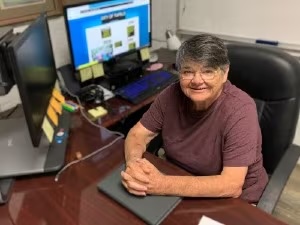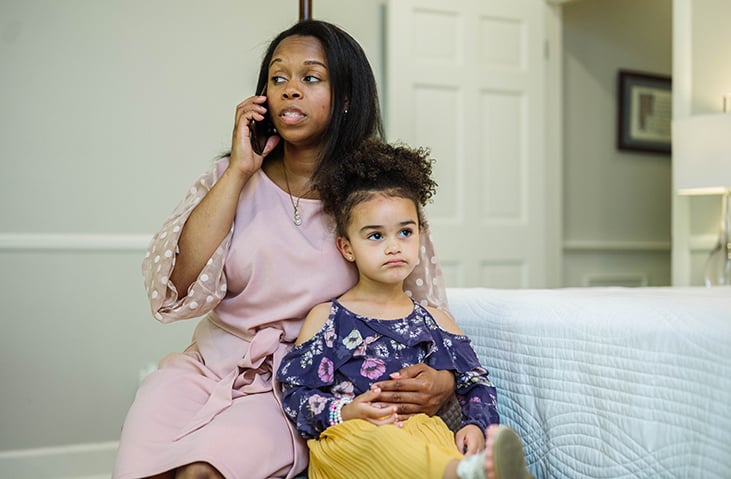

Jul 20 2022
Seeing the Possibilities


Summary
Low vision might have made life more challenging, but Leesha Faulkner refuses to let it get the best of her. Low Vision Rehabilitation is helping her see the possibilities.
“I was, quite frankly, terrified that I wouldn’t be able to do my job."

Low vision might have made life more challenging, but Leesha Faulkner and her team refuse to let it get the best of her.
“I read and write for a living,” says Leesha, 67, who serves as curator of the Oren Dunn City Museum in Tupelo. “I spend a lot of time in front of a computer screen. I work on projects using old documents which are hard to see with good eyes.”
A longtime journalist, a large part of her current job is doing research and designing visuals for museum exhibits.
In the early 1990s, Leesha started losing vision in her left eye because of trauma, and now she sees only a thin “slice” through that eye. In 2021, when she started losing vision in her right eye—her “good” eye—she knew she was in trouble.
Leesha was diagnosed with wet macular degeneration, a chronic eye disorder caused by abnormal blood vessels that leak fluid or blood into the macula, the part of the retina responsible for central vision. She also has glaucoma, which damages the optic nerve. To prevent further vision loss, she uses prescription eye drops and gets anti–vascular endothelial growth factor (anti-VEGF) therapy via injections directly into her eye.
“It’s pretty emotional. One of my greatest fears in life is going blind,” Leesha says. “I’m grieving. Some mornings I wake up and cry.”
But Leesha’s team is helping her see the possibilities. Her optometrist, Chelsea McKnight, O.D., referred her to retina specialist Heather Hancock, M.D., at North Mississippi Retina Center. “I thought I’d be able to see a lot better after my first ‘eyeball shot,’” and when I didn’t, I was frustrated,” she says. Dr. Hancock referred her to Cheri Harbour, an occupational therapist who specializes in low vision rehabilitation.
“Cheri showed me apps on my cell phone and iPad with magnifiers and lights,” she says. “She even came to my office and helped me change settings on my computer to make things bigger and easier to see. She recommended blue light glasses so my eyes don’t get as tired when I’m reading and designing.”
Thanks to the City of Tupelo, Leesha now has a large screen for her desktop computer. Cheri also connected her with helpful resources, including Christian Williams of the Mississippi Department of Rehabilitation Services, Office of Vocational Rehabilitation for the Blind. Christian helped her acquire a desktop magnifier as well as a portable one she can take to the library for research. She also uses a lighted keyboard with large keys, as well as a large screen computer at home because, she says, “work doesn’t stop at 5 p.m.”
While Leesha, a self-professed “nerd,” misses holding books in her hands, she now reads on her iPad or Kindle, takes advantage of replica versions of newspapers online and listens to audio books and magazines through BARD (Braille and Audio Reading Download), a free library service.
“During one appointment, Cheri came to my house,” Leesha says. “She helped me get under-the-counter lights for the kitchen so now I don’t cut myself when I’m cooking. She changed all my light bulbs to ones that help me see better. That’s the joy of having someone like her.”
Though not the path she would have chosen for herself, Leesha is grateful for those accompanying her on the journey. “I was, quite frankly, terrified that I wouldn’t be able to do my job,” she says, “but I can and do it quite well, thank you very much.”

Shot with a Canon camera and autofocus, but settings to accommodate the lighting, Leesha Faulkner posted a plethora of these performance photographs from the recent Tupelo Elvis Festival. She used the expertise of her low-vision team and equipment furnished by the Mississippi Department of Rehabilitation Services to work this assignment. At one time Faulkner worried she would have to give up this opportunity because of her low vision.
NMMC Low Vision Rehabilitation Services help people like Leesha make the most of their remaining vision for preparing meals safely, managing medicine, preventing falls, paying bills and managing finances, leisure activities and more. Medicare and most insurance will cover low vision services when provided by an occupational therapist and referred by an optometrist, ophthalmologist or other health care provider.

Subscribe to Our Newsletter
Like this content and want to get more? Sign up for True North, the health and wellness newsletter from North Mississippi Health Services!

Subscribe to Our Newsletter
Like this content and want to get more? Sign up for True North, the health and wellness newsletter from North Mississippi Health Services!

Nurse Link®
Not sure if you need Urgent Care or the ER? Call 1-800-882-6274 anytime to speak directly to a registered nurse and get immediate answers. Using computerized medical protocols, nurses direct callers to the most appropriate treatment. Our nurses are available 24 hours per day, seven days per week.